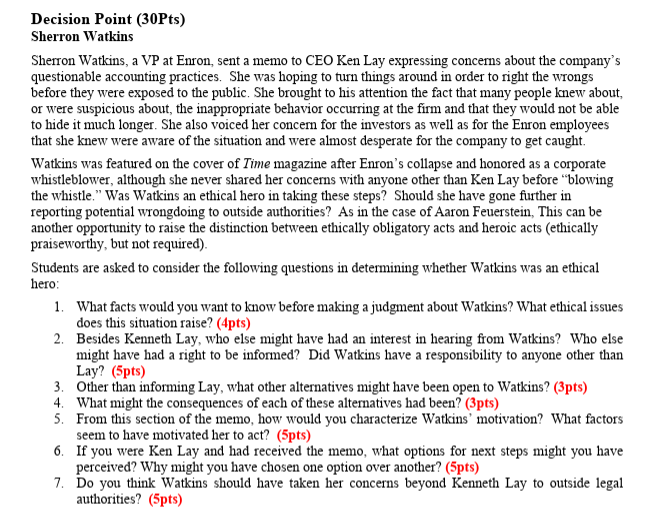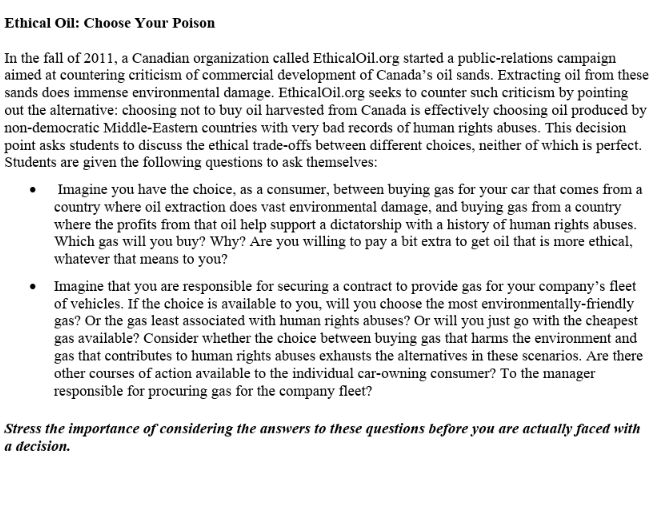Decision Point: (3Pts} Shel-run Watkins Sherron Watkins, a VP at Enron, sent a memo to CED Ken Lay expressing concerns about the company's questionable accotmting practices. She was hoping to turn things around in order to right the wrongs before they were exposed to the public. She brought to his attention the fact that many people knew about. or were suspicious about, the inappropriate behavior occurring at the rm and that they would not be able to hide it much longer. She also voiced her concern for the investors as well as for the Enron employees that she lenew were aware of the notation and were almost desperate for the company to get caught. Watkins was featured on the cover of Ions magazine after Enron's collapse and honored as a cta'porate whistleblower. although she never shared her concerns with anyone other than Ken Lay before \"blowing the whistle." Was Watkins an ethical hero in talcing these steps? Should she have gone further in reporting potential wrongdoing to outside authorities? As in the case of Aaron Feuerstein. This can be another opportunity to raise the distinction between ethically obligatory acts and heroic acts [ethically praiseworthy, but not required}. Students are asked to consider the following questions in determining whether Watkins was an ethical hero: 1. What facts would you want to know before making a judgment about Watkins? What ethical issues does this situation raise? (dpts) 2. Besides Kennett: Lay. who else might have had an interest in hearing from Watkins? Who else might have had a right to be informed? Did Watkins have a responsibility to anyone other than Lay? {Spts} 3. Elmer than informing Lay. what other alternatives might have been open to Watkins? {ths} 4. What might the consequences ofeach ofthese alternatives had been? {Sptsj 5. From this section of the memo. how would you characterize Wattdnsl motivation? What factors seem to have motivated her to act? {Spts} ti. If you were Ken Lay and had received the memo. what options for neat steps might you have perceived? Why might you have chosen one option over anott.ie:I"'.t [5pm] ?. Do you think Watkins should have taken her concerns beyond Kenneth Lay to outside legal authorities? {Spts} Ethical Oil: Choose Your Poison In the fall of 2011, a Canadian organization called EthicalOil.org started a public-relations campaign aimed at countering criticism of commercial development of Canada's oil sands. Extracting oil from these sands does immense environmental damage. EthicalOil.org seeks to counter such criticism by pointing out the alternative: choosing not to buy oil harvested from Canada is effectively choosing oil produced by non-democratic Middle-Eastern countries with very bad records of human rights abuses. This decision point asks students to discuss the ethical trade-offs between different choices, neither of which is perfect. Students are given the following questions to ask themselves: Imagine you have the choice, as a consumer, between buying gas for your car that comes from a country where oil extraction does vast environmental damage, and buying gas from a country where the profits from that oil help support a dictatorship with a history of human rights abuses. Which gas will you buy? Why? Are you willing to pay a bit extra to get oil that is more ethical, whatever that means to you? Imagine that you are responsible for securing a contract to provide gas for your company's fleet of vehicles. If the choice is available to you, will you choose the most environmentally-friendly gas? Or the gas least associated with human rights abuses? Or will you just go with the cheapest gas available? Consider whether the choice between buying gas that harms the environment and gas that contributes to human rights abuses exhausts the alternatives in these scenarios. Are there other courses of action available to the individual car-owning consumer? To the manager responsible for procuring gas for the company fleet? Stress the importance of considering the answers to these questions before you are actually faced with a decision








